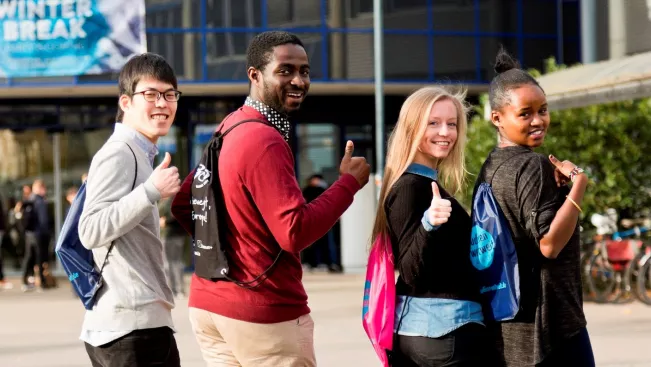Communications and Marketing
University scores highly in terms of internationality

The study, commissioned by the German Academic Exchange Service (DAAD), the German Rectors' Conference (HRK) and the Alexander von Humboldt Foundation (AvH), compared the internationalisation performance of state universities for the ninth time. The beacon of internationalisation at H-BRS is the Master's degree programmes: 36.5 percent of all Master's students in the 2017 academic year had an international nationality. "This is an excellent figure, especially when compared to the average for all German universities at around 18 per cent and the large universities of applied sciences at around 15 per cent of Master's students," says Prof. Dr Jürgen Bode, Vice President International Affairs and Diversity at H-BRS. Among the large universities of applied sciences (HAW, formerly universities of applied sciences) with more than 5,000 students, this puts them in third place nationwide.
Asia and Africa most common regions of origin
In 2017, H-BRS was not only among the top 10 large UAS in terms of student numbers, but also in terms of Master's degrees awarded to international students (31.6 per cent). In the same year, H-BRS achieved around 17 per cent of international students overall. In comparison: according to the study, around 13 per cent of students at all German universities in 2017 were of international nationality. Asia (40 per cent) and Africa (32 per cent) were the leading regions of origin for international students at H-BRS. "This shows that our endeavours to cooperate with universities in China and sub-Saharan Africa are bearing fruit," says Vice President Jürgen Bode
Top EU external funds in the reporting year
Another highlight in the report: the share of EU external funds in the total external funds received by H-BRS and the distribution of EU external funds per professorship. Here, the university ranked third in Germany among large universities of applied sciences: 28 per cent of its external funds came from the EU, resulting in an average value of 20,946 euros per professorship. "This is a very good result," says University President Hartmut Ihne. The figure is significantly better than the average for all German universities (including universities), which received around 8 per cent of their external funds from European Union institutions in 2016. However, this is a snapshot for 2016; experience shows that the amount of third-party funding fluctuates from year to year.
Good basis for improvements
According to the study, there is potential for improvement both in the proportion of international professors and in the international mobility of students. According to Bode, intensive work will be carried out on both points in the coming years.
The good results achieved by Hochschule Bonn-Rhein-Sieg in terms of internationalisation are due in part to the large number of English-language degree programmes: five Master's degree programmes - Autonomous Systems, Biomedical Sciences, CSR and NGO Management, Marketing and Social Protection Systems - and the two bachelor's degree programmes - Applied Biology and International Business - are currently offered entirely in English. The Master's programme in International Media Studies in cooperation with Deutsche Welle Akademie is offered bilingually.
Do you still have questions?

Jürgen Bode
Vice President for International Affairs and Diversity, Professor at the Department of Management Sciences (Rheinbach Campus), Alumni Commissioner
Location
Rheinbach
Room
B 124
Address
von-Liebig-Straße 20
53359, Rheinbach
Telephone
+49 2241 865 604
[Archive] Eva Tritschler
Press and Public Relations, Spokeswoman/Editor-in-Chief of the university magazine doppelpunkt:
Location
Sankt Augustin
Address
Grantham-Allee 20
53757 Sankt Augustin